How to Do SEO for Startups the Right Way
Running a startup means dreaming big and working hard to create an awesome product even if nobody knows about it just yet. This is precisely why you should get started with SEO early. The sooner you optimize your site for search engines, the better. SEO should also be a staple of your gameplan because it is a major source of targeted traffic, and unlike other marketing channels, SEO will not drain your budget. Sure, website optimization comes at some cost, but it’s nothing compared to massive expenses on channels like PPC. SEO, as you’ll soon see, is about more than just gaining organic traffic. It’s also about building trust and understanding your audience, among a variety of other factors.
In this post, we’ll briefly cover all the major benefits of making SEO the core of your promotion strategy. We’ll also outline the main processes that you’ll have to add to your daily routine that will prompt search engines to spoil your website with more opportunities for exposure. So, let’s start by looking at the reasons why SEO is well worth the effort and how it can take your website to Google’s page one.
What makes startup SEO different from regular SEO?
There are few, if any, differences in terms of approach. Search engines have the same website requirements for well-established businesses as they do for startups. Regardless of the business’s or website’s size, everyone should create high-quality and helpful content that is optimized for search intent, have a healthy backlink profile, and monitor and fix any technical issues that the site has.
However, some SEO challenges are unique to startups. These occur less frequently or have less of an impact on sites performing regular SEO. These are:
- Market challenges
This is a two-fold problem. Startups that are pioneers in their niche have to interact with a new market, which can be uncharted territory for them. On the other hand, startups can enter the already existing market but offer some brand-new product or service. Determining user intent for both cases can be more complicated than usual. Analyzing competitors can also be challenging because startups may not know who their competitors are or there may simply be no direct rivals. This can make it difficult to build a data-driven SEO strategy.
- Limited resources
Startups frequently have a more limited budget and time frame. With minimal resources, they must achieve the desired result faster, which can result in less accurate testing and appraisal of their business offerings. Even if a startup manages to raise funds and the budget includes SEO expenses, a young business needs to report to investors and show results to ensure continued funding.
Benefits of SEO for startups
Better website visibility
When you’re in the early stages of a startup, the only people typing your website address into Google’s search box are you and your team members. If you want other people to spot your project, you’ll have to either invest in paid advertising or start doing SEO to help your website rank high—or combine both.
Once your SEO efforts yield their first results and you make it to the top 10, your website visibility will improve and people will be able to discover your website organically. The number of visitors you will get will vary depending on your business’s niche, the popularity of the keywords you rank for, and also your SERP ranking position (where higher rankings equal better visibility). According to research by Advanced Web Ranking, positions 10 to six combined get less traffic than position three alone, while position one gets one-third of all traffic.
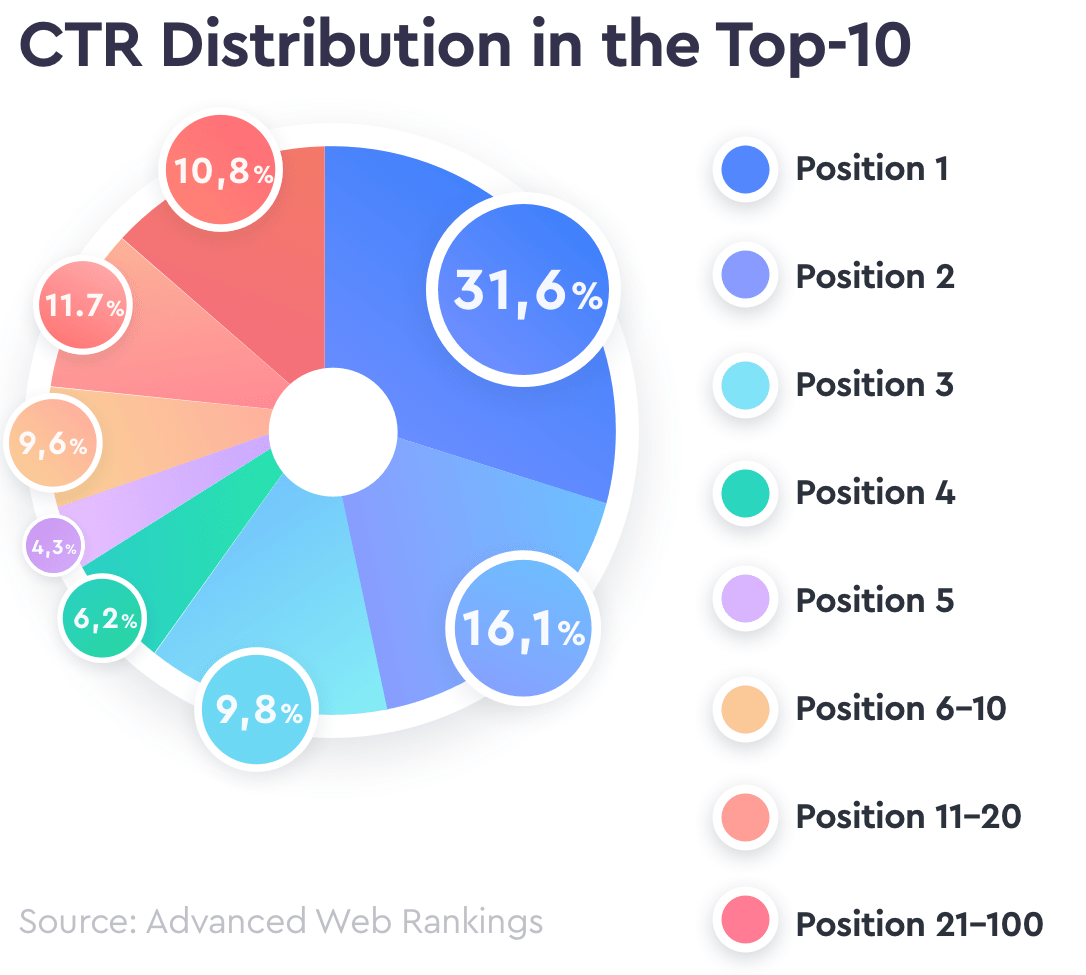
This means your website’s visibility will grow as you move up the ranking ladder. The higher you rank, the more people will pick you in search over other websites.
Enhanced users trust
As you start ranking high for more keywords, users will see your brand more often. If you choose the right strategy, trust in your brand will grow. Users also believe that websites that rank fairly high in SERPs are more credible. They are correct because Google now favors websites that demonstrate higher EAT: expertise, authoritativeness, and trustworthiness.
If users regularly spot your website at the top of the SERP when searching for content in your niche, their trust in your brand will grow. This means that they will be more eager to click on your website link when seeing your brand name, be it on the SERP or elsewhere on the web.
Targeted traffic that lasts
High-quality SEO gives you a steady flow of organic traffic that can last for some time after you stop optimizings. Organic traffic is also longer lasting than traffic from paid advertising because the latter brings visitors to your site only for as long as you pay for it. This is one of the major reasons why startups prefer SEO over other means of traffic acquisition.
Also, consider the quality of the traffic that SEO can bring. Ranking high for relevant commercial keywords like “buy summer shoes” or “CRM for small business” will bring you highly targeted traffic that converts well. You just need to give users what they need. People come to search engines with some intent in mind, be it to choose the best product of its kind or to find problem solving tips. If your website succeeds at fulfilling users intent, you will get highly interested leads who you can move down your marketing funnel and turn into customers.
Data for creating customer personas
To meet your customers’ intent, you need to know who your customers are and to understand their needs. This is not always easy for startups who are still getting acquainted with their target audience.
Consider doing keyword research, which is one of the cornerstones of any SEO strategy. It can help startups get insights into their potential customers’ needs and pain points. Keyword research can also help you learn what your potential customers are looking for on Google, the problems they are discussing in forum threads and when they prefer to watch a video instead of reading a blog post. You just need to do keyword research in a meaningful way, as described in this guide, and add a professional keyword generator to your SEO toolkit to find more keyword opportunities.
Also, consider adding a Google Analytics code to your website. It will allow you to track tons of useful data, including age, gender and the geographical location of users who visited your website.
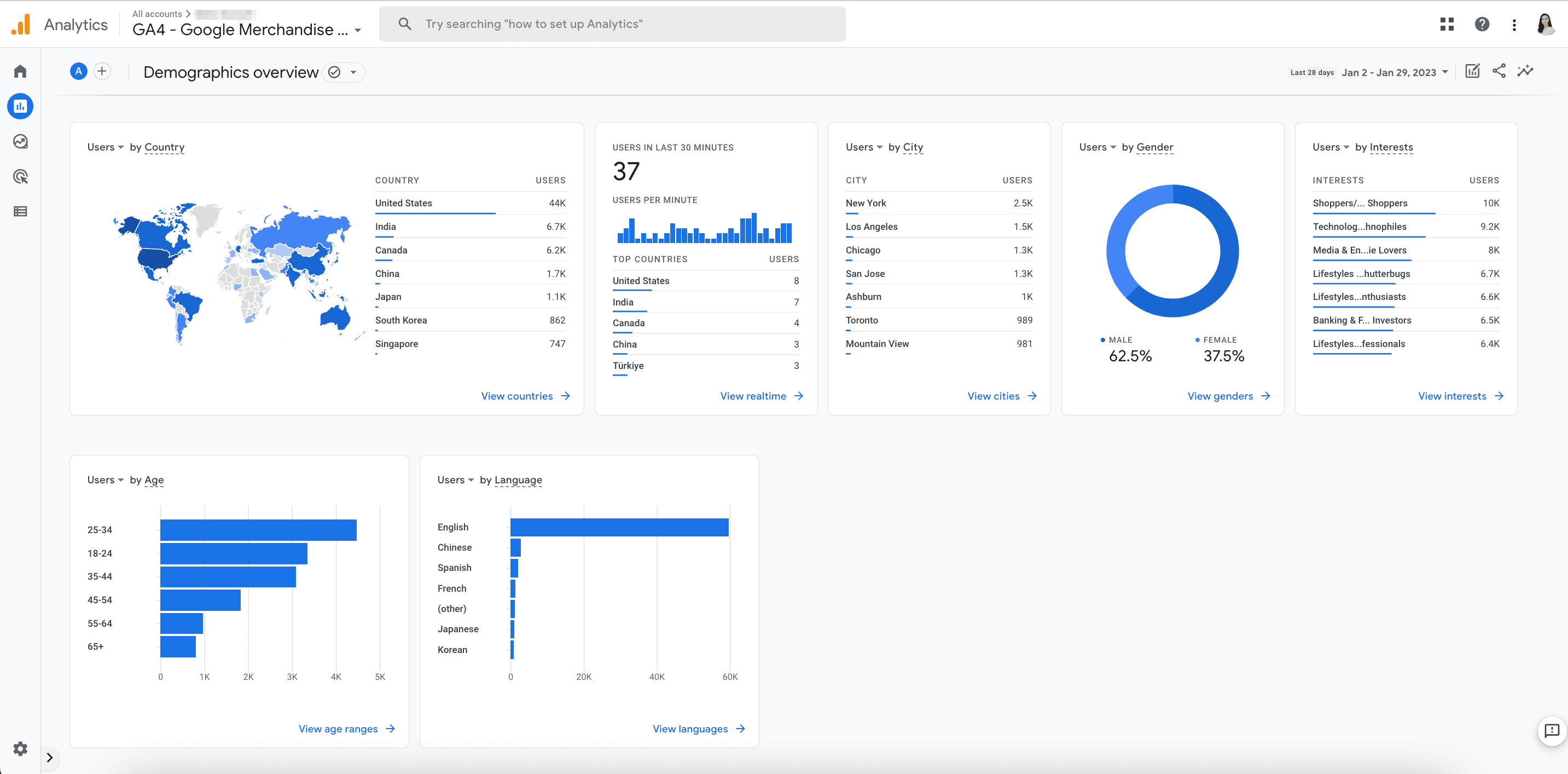
You can further use data from Google Analytics to see how different groups of customers interact with your website. Then, you can make all the necessary changes to better meet the needs of the group you want to target.
Visitors to your local business
Startups that do their business locally and run a brick and mortar store should focus on attracting visitors to their shop or café rather than to their website. Even so, they can benefit just as much from SEO as online businesses. Research is an essential component of the buying cycle, and many customers now prefer to do it online. According to Google’s 2022 Retail Marketing Guide, “open now near me” searches have grown globally by over 400% (YOY). People are running local searches through Google to do things like choosing a restaurant to visit on Saturday night or finding a nearby dentistry with reasonable pricing.
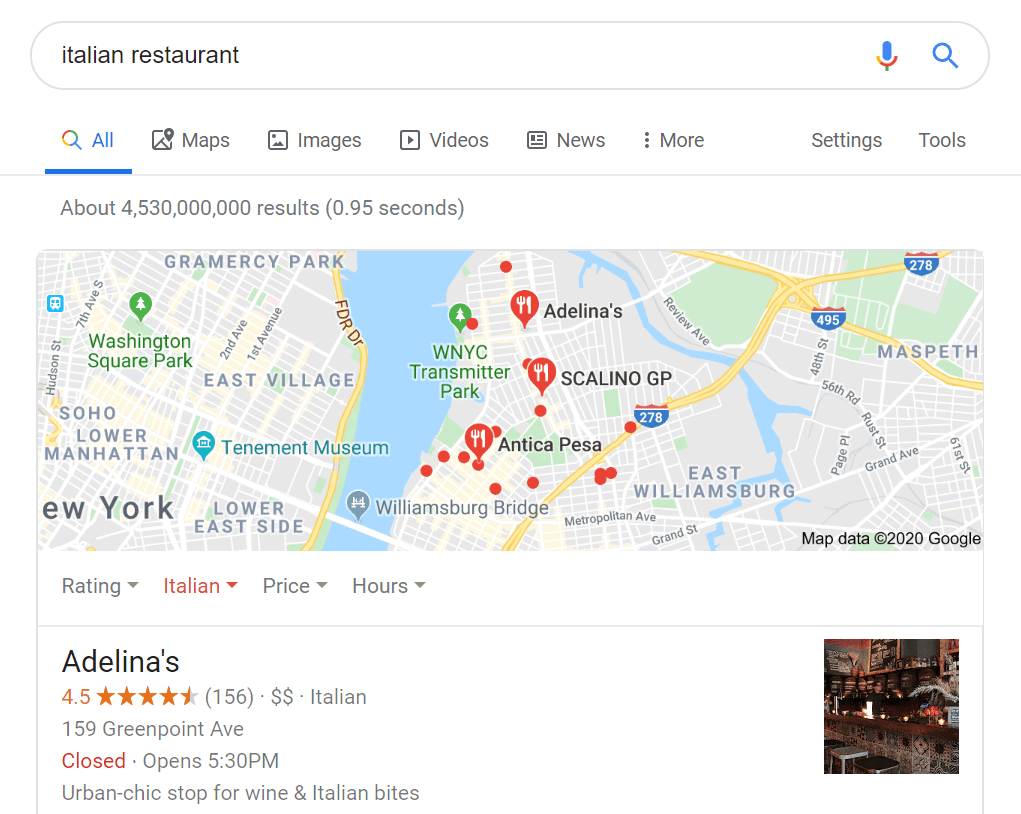
Users, just like in traditional search, will click on the first set of results when conducting a local search. This means you need to rank fairly high for users to spot you. Start by creating or verifying your Google Business Profile: this is how Google learns that your business exists.
Smarter budget allocation
Last but not least, doing SEO for startups is money well spent. Naturally, SEO includes some expenses, such as hiring SEO and technical specialists, as well as getting all the necessary tools for them to work with. Attracting users with paid ads will still cost you so much more, so doing SEO is a great way to save on your marketing budget and invest more in product and website development.
If you have some free time and an inquisitive mind, you can save even more money by doing all of the SEO work for your startup yourself. All you need to master the SEO basics is some time and a pinch of dedication.
That being said, if you are ready to start your SEO journey, let SE Ranking’s all-in-one SEO platform be your trusted guide. Here, you’ll find a Marketing Plan, which is an extended checklist with best SEO practices, that will help you along the way.
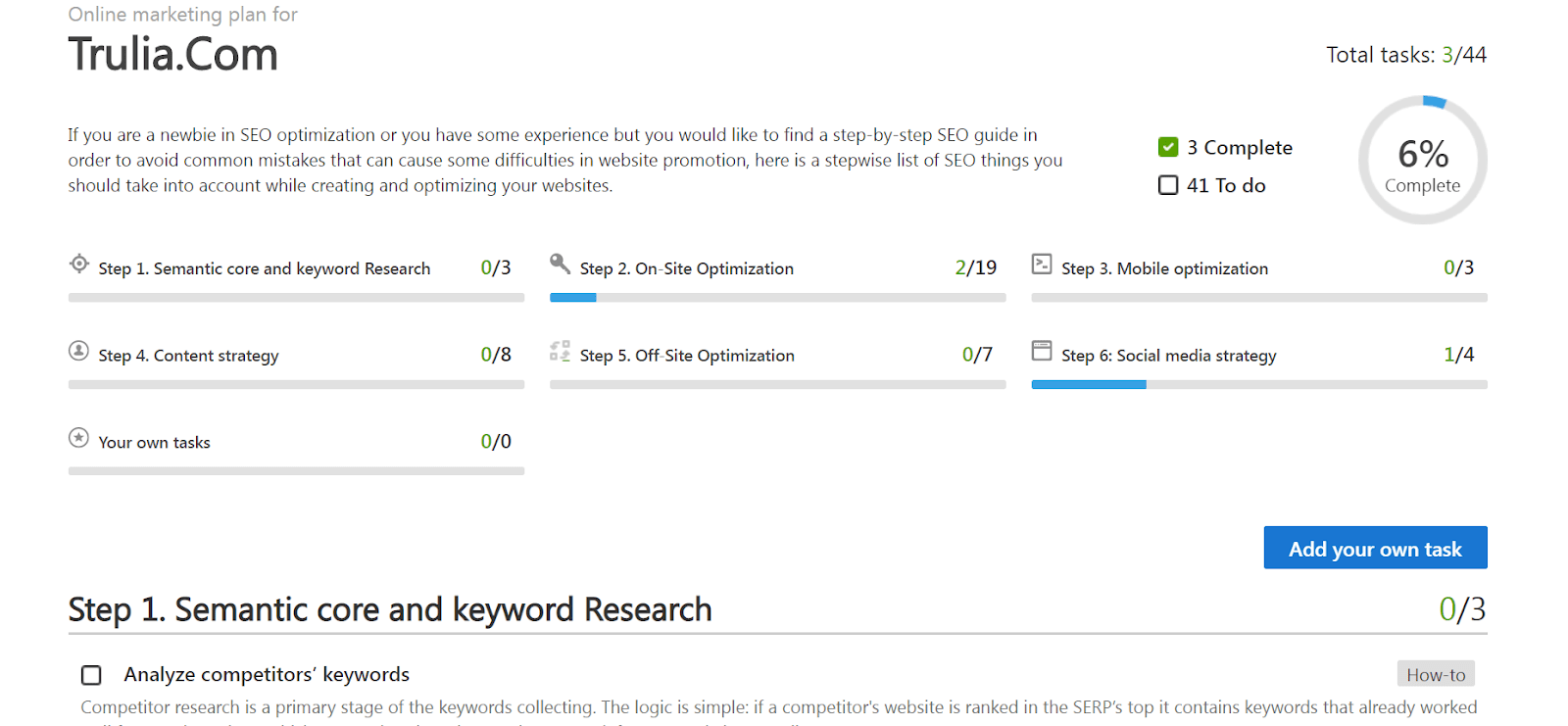
The SE Ranking platform can also help you accomplish all of the cornerstone SEO tasks that you’ll find in the Marketing Plan. We offer plenty of SEO tools under a single subscription plan, such as Competitor Research, Website Audit, Keyword Rank Tracker, and more. Try all of them out for free with our 14–day free trial.
While the Marketing Plan provides you with plenty of steps to complete, don’t get overwhelmed by the number of tasks ahead of you. SEO is actually doable if you set your priorities right. And, so you don’t lose your footing, let’s briefly outline the processes that you’ll need to familiarize yourself with in order to start moving in the right direction.
When a startup needs SEO
Every startup’s need for SEO is dependent upon several factors:
- The startup’s goals.
SEO is about long-term plans and goals. Startups should understand that achieving their desired results will take some time. SEO isn’t like paid advertising which brings in customers right away. So, if you’re ready to play the long game, doing SEO is a must.
- The startup’s marketing budget.
SEO is suitable for startups with a limited budget for marketing. It allows them to reach new and potential clients and boost search visibility at a low cost, avoiding those high advertising costs. It can even cost as little as nothing sometimes because of free tools like Google Search Console and Google Analytics. By combining these with paid (and more advanced) tools, startups can achieve better SEO results.
- The startup’s sales and marketing channel.
SEO is indispensable if the startup runs its business online through its website. Doing SEO right helps startups reach the top of the search results, bypass all competitors, and attract the right kind of customers: buyers who can bring profit to the company and contribute to its scaling.
If the startup has an app, search optimization is also needed, but the focus here should be on app stores instead of search engines. This approach is called ASO (App Store Optimization). Similarly to SEO, ASO improves the app’s or game’s visibility and position in the app store and increases the app’s number of organic downloads.
Last but not least, SEO provides huge organic potential that can catapult a startup to a whole new performance level. It assists in bringing in free users from organic search results and increases the amount of high-quality organic traffic by creating more effective targeting and data.
When a startup doesn’t need SEO
While SEO has many benefits, not every startup needs to implement a full-scale SEO strategy. There are times when it’s perfectly acceptable to omit optimization. For example:
- The startup just needs to test some idea or project before developing a long-term strategy.
- The startup needs quick results in a couple of weeks or months.
Market complexities can be another reason startups don’t use SEO to its full potential. Until you understand your niche and market and determine the intent of your customers, SEO can be of little use. This does not imply that you should put SEO on the back burner for good. Instead, to get more measurable results, you should do more thorough research and invest more time in devising your strategy.
Sometimes startups won’t reap the benefits from doing SEO because no one is searching for their product or service. The market they’re in is so new that there are no search queries from users. Companies can’t even identify keywords to optimize their content for. If that’s the case, before doing full-fledged search engine optimization, startups should begin by using other channels to increase awareness of their products or services.
Be sure to check a website’s SEO and see how well-optimized it is for both search engines and people using our very own SEO Checker.
How to do SEO for startups
While Google is keeping mum about the exact ranking factors it uses, SEO for startups usually goes through the same flow as regular SEO. The problem is that startups may not have enough resources in the very beginning to cover all the essential bases. This is okay as long as you focus on the SEO factors that really make a difference to your business.
Let’s take a closer look at some crucial SEO factors for startups.
Building an effective startup SEO strategy
Establish your goals and match them with your marketing budget. Your goal as a startup might be to:
- Increase organic traffic
- Generate leads and turn them into customers
- Improve brand awareness
- Boost sales
Startups oftentimes combine several goals that complement each other. For example, if you plan to increase organic traffic, your sales may go up as well.
Researching competitors is a common first step in terms of SEO for all of your startup goals. At this stage, startups can find out who their rivals are (or whether they have any at all) and what optimization approaches they use. Performing a Competitor analysis helps you in discovering the following:
- The technical strengths and weaknesses of your rivals’ site;
- The keywords they rank for;
- The sites they link to and get backlinks from;
- And more.
Startups can make use of these insights to enhance their SEO strategy.
The next step is defining a list of your target keywords. After investigating your competitors, you should already have a pool of keywords available for use during optimizations. But you should still try to identify the words and phrases that your visitors are using to find your website, product, or service.
Here’s how.
Begin by defining the seed keywords. This is the starting point for collecting a pool of related or similar words and phrases to use later in your content (more on this in the following sections). Analyze and group the keywords you’ve collected based on their user intent. Then, use this data to create new pages and content.
To harmoniously distribute the keywords you chose in the content on your site, think over the structure and hierarchy of your site. Consider making it linear or choosing a network, tree-like structure. This is important because having an SEO-friendly structure helps both users and search bots navigate your website. It also increases your chances of getting SERP features.
The next component of your SEO strategy should be content. The general approach to content marketing for startups is similar to that of regular businesses. Try thinking over various content types and creating a plan based on keyword research. This will help you fill your site with valuable and relevant information that matches your users’ requests and intents. Having a content plan in place will also speed up the content creation process.
If you want to create SEO-friendly texts faster, learn more about SE Ranking’s new content tool. It will suggest the most suitable content parameters and help you create comprehensive SEO briefs based on insights from top-performing organic competitors.
Finally, consider link building for startups. Think about it in the following three ways:
- Build links internally. Connect your website pages using internal links to pass link juice and help search engines detect new pages.
- Link out to trusted websites. This makes your content more valuable and encourages cooperation with other companies and their resources.
- Get high-quality backlinks. Point these to your website to build a strong backlink profile that will improve your rankings.
One more thing to keep in mind if you run a local startup is GBP optimization. Your Google Business Profile holds key information that your customers need, including your contact details, office hours, customer reviews, photos of your store, and the link to your website. Make sure to fill in all the details that can encourage users to pay you a visit. For example, consider adding a photo of your restaurant menu or a list of services that your dentistry offers. Also, having a complete profile with positive user reviews will help you rank higher in local search because GMB signals are currently the dominant ranking factor in the Local Pack.
Filling your website with quality content
Quality content is still king in 2024. And by quality, we mean a well-structured piece that offers unique value and solves the problems your users have. Let’s talk about what it takes to make your content well-structured, unique and problem-solving oriented.
- Making your content well-structured. Find someone knowledgeable in your field who writes well to get easy-to-grasp, meaningful, and grammatically correct texts.
- Creating something unique. Begin by understanding what is already offered on the market, then translate that into competitive research. Your findings will reveal how strong your competitors are as well as which topics they cover so that you can create something different and claim your market share.
- Solving your users’ problems. Perform meaningful keyword research and get clear on the user intent behind every keyword you target.
SE Ranking’s Keyword Suggestion tool will help you fulfill the last requirement. Just paste a broad term relative to your business’s niche into the search box, and the tool will come up with thousands of suggestions. Our advice for startups is to go for long-tail keywords (3-5 words or more). They can be found in a separate tab of the Keyword Suggestion tool.
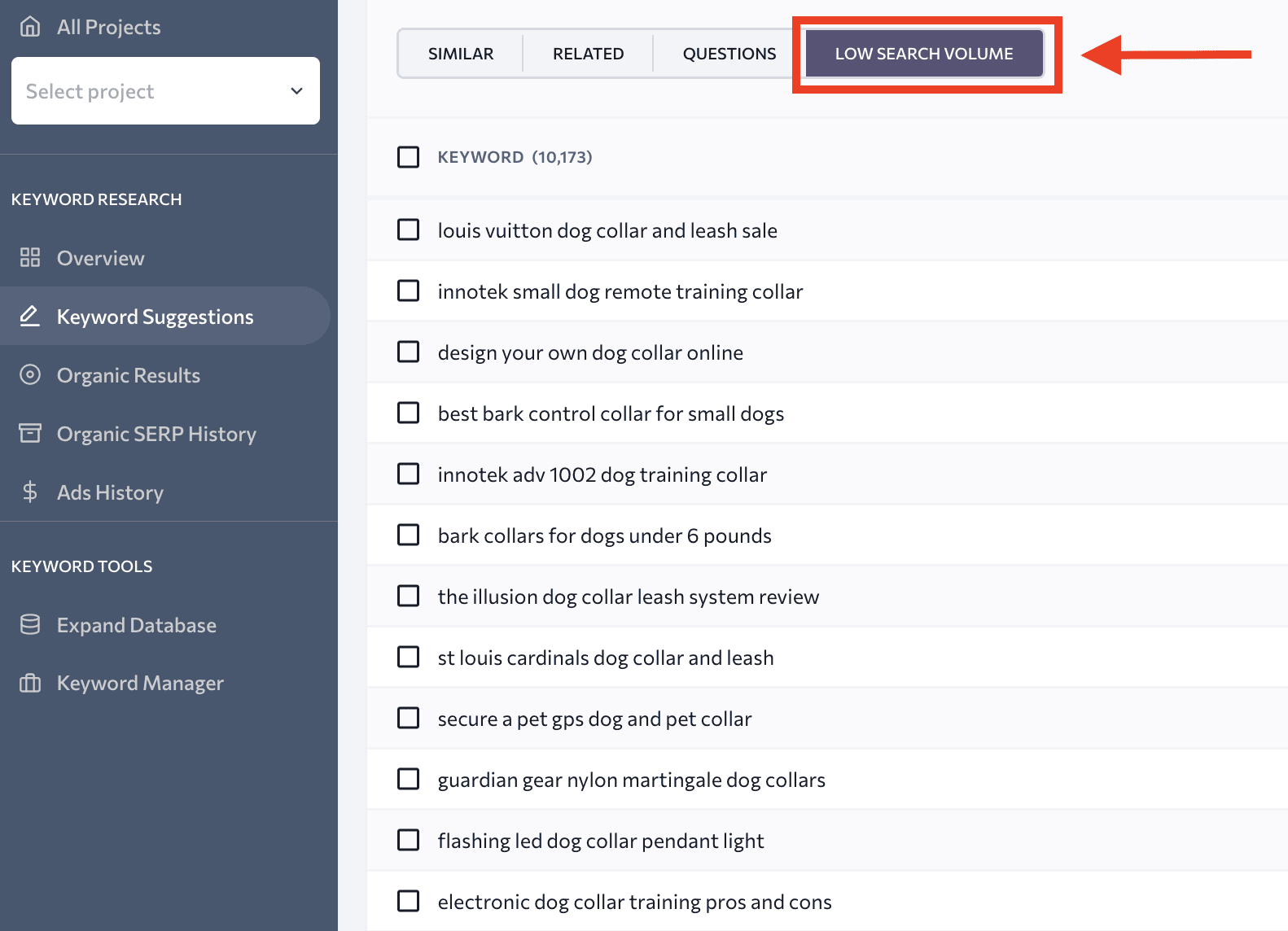
Use Filters in the Keyword Suggestion tool to sort keywords by word count. You can set up whichever count you want.
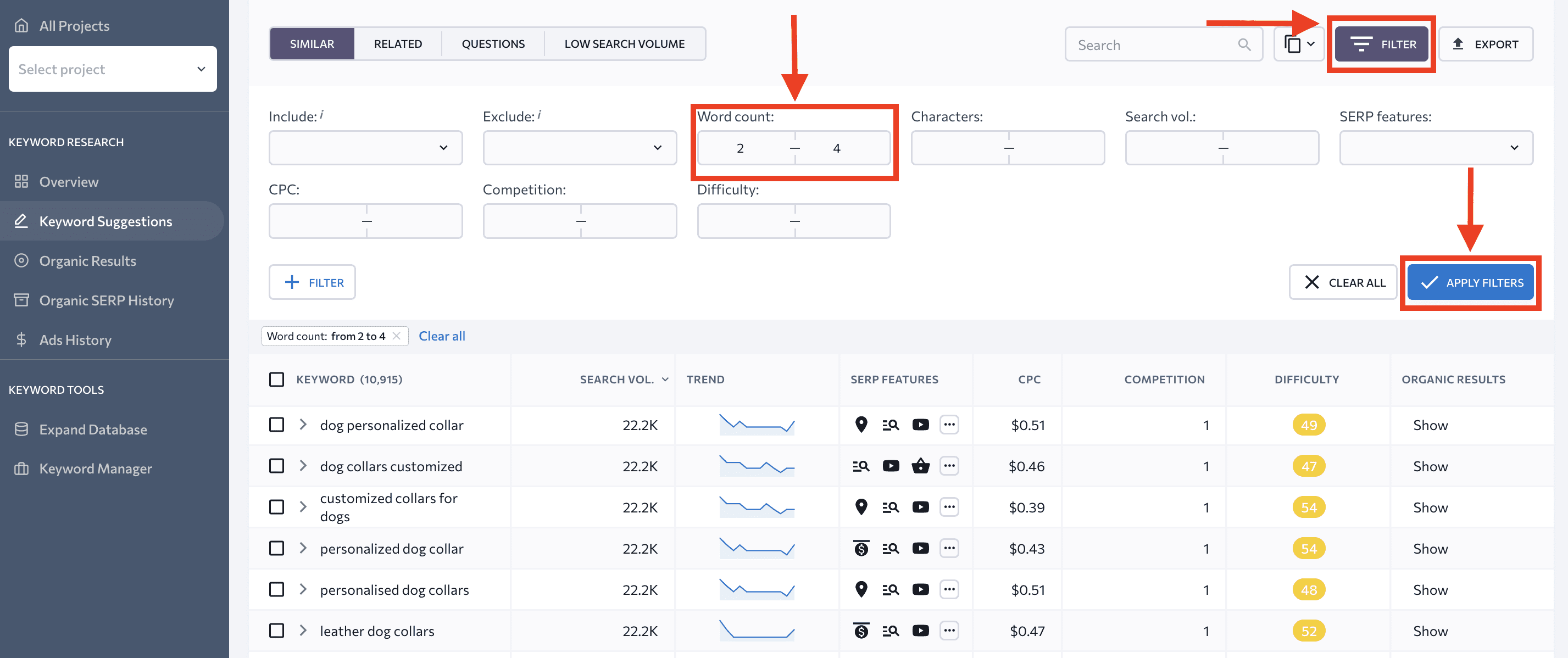
Long-tail keywords rarely receive many monthly searches, but they are highly targeted and convert better. For example, if you Googled training collar for small dog, you are more likely to buy the goods than someone Googling a broad term like dog collar. Doing long-tail keyword research will provide you with low-competitive terms, allowing you to rank high for these terms rather fast.
This doesn’t mean that you should totally ignore other search terms. You can also benefit from short- and medium-tail keywords.
Short-tail keywords usually contain one to three words and are very broad. Many websites target them, which makes them too competitive and difficult to target for startups. Medium-tail keywords can consist of two to four words. They are more specific than short queries and not as competitive.
Content alone won’t be enough to promote a site for short- and medium-tail keywords. You’ll need to actively build backlinks, which takes lots of time and resources. The result, however, will please you because these keywords can bring profit to your startup.
Sometimes, though, you may not find any short, mid, or long-tail keywords for your website. You actually may not find any keywords describing your product at all. This accounts only for product pioneers who have developed previously nonexistent products or services For example, before thousands of people started Googling pet cameras, they had to be invented first and then promoted to the public.
If this is the case for your startup, the only way for you to understand what your customers want is to actually talk to them. Insights from the sales and support team can help you with this. To benefit from SEO, shoot for keywords that describe the problem your product solves, such as “watch your pet” along with keywords standing for similar products like “home camera”.
Checking on your website’s technical health
You can have excellent content on your website, but it won’t matter if users have to wait for pages to load or if the website is practically unusable on mobile. Both users and Google favor websites that are fast, error-free, and user-friendly, so your task is to stay on top of every technical issue that may impede your SEO growth.
SE Ranking’s Site Audit tool can help you identify all technical errors that your website has. It not only measures your website’s speed and how well it is optimized for mobile, but it also spots duplicate pages, indexing issues, server errors, and lots of other things. To top it off, it provides recommendations on how these errors can be fixed.
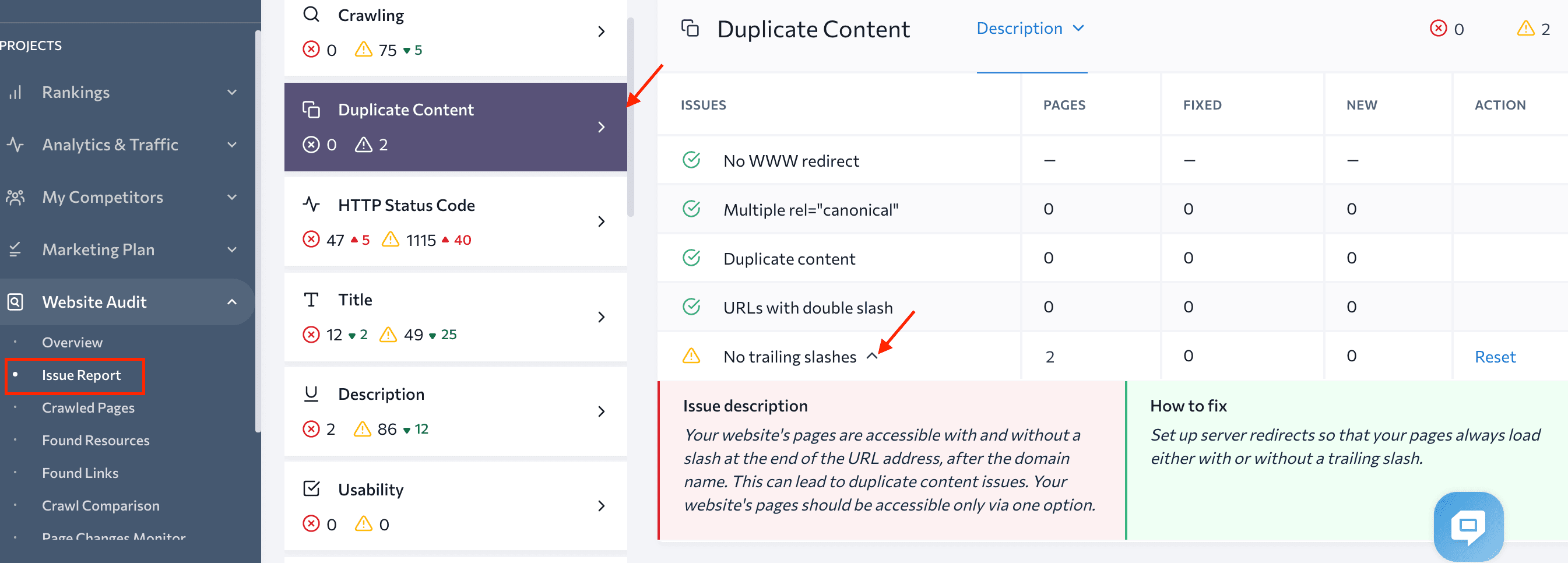
One of the most critical errors your startup’s site can face is non-indexed pages. If your pages aren’t indexed, they won’t appear in search results, and your potential customers won’t be able to find them and buy from you.
Indexing problems can occur for several reasons:
- Poor quality content. If you publish non-unique and low-quality texts that don’t help users satisfy their intents and don’t meet search engines’ requirements, expect indexing problems and sometimes even a penalty.
- Your site pages are blocked from indexing. Your robots meta tags can be set to Noindex. This instruction tells Google not to index the page. Your pages can also be disallowed in the robots.txt file. They can still be indexed if linked to from other pages or sites.
- Your pages contain canonical tags to other pages. The search engine may consider them to be non-primary versions of pages and will ignore them.
- Your domain is brand new. This often happens with new websites, which can have indexing issues for weeks or even months.
Check out this website audit guide to learn about the technical errors that can keep you from reaching the top and should be fixed asap.
Dealing with on-page optimization
On-page optimization means setting up and improving the various SEO elements on your site. It allows search engines and readers to better understand your content and interact with your website.
Quality on-site SEO can increase your rankings if you focus on certain SEO elements, such as:
- Textual content
Pay attention to the keywords used in the body of your content. Also, look at your content’s keyword density, headings, uniqueness, readability, etc.
- Meta title and description tags
Specify unique titles and descriptions for each page and ensure that they are within the acceptable length limits. Don’t forget to include relevant keywords so that bots and visitors can understand what the page is about.
- H1 tags
This is another element that helps define the content’s purpose. Unlike the title tag, it is located on the page. Include one unique H1 per page and add topical keywords to it.
- URLs
Making your page URL SEO-friendly can improve its UX, which also impacts its ranking. Well-optimized URLs are easy to read and include keywords but don’t contain uppercase letters and underscores. Strive for 50-60 characters per URL.
One simple and easy way to check how optimized your pages are is to use SE Ranking’s On-Page SEO Checker. Just enter the page’s URL and run an audit. After that, the platform will provide you with a detailed report of all on-site issues detected.
You’ll see the page’s quality score, top organic competitors for the keywords you’ve added, and a list of all issues found, divided into Errors, Warnings, Notices, and Passed Checks.
Another feature that every startup can benefit from is SEO tasks.
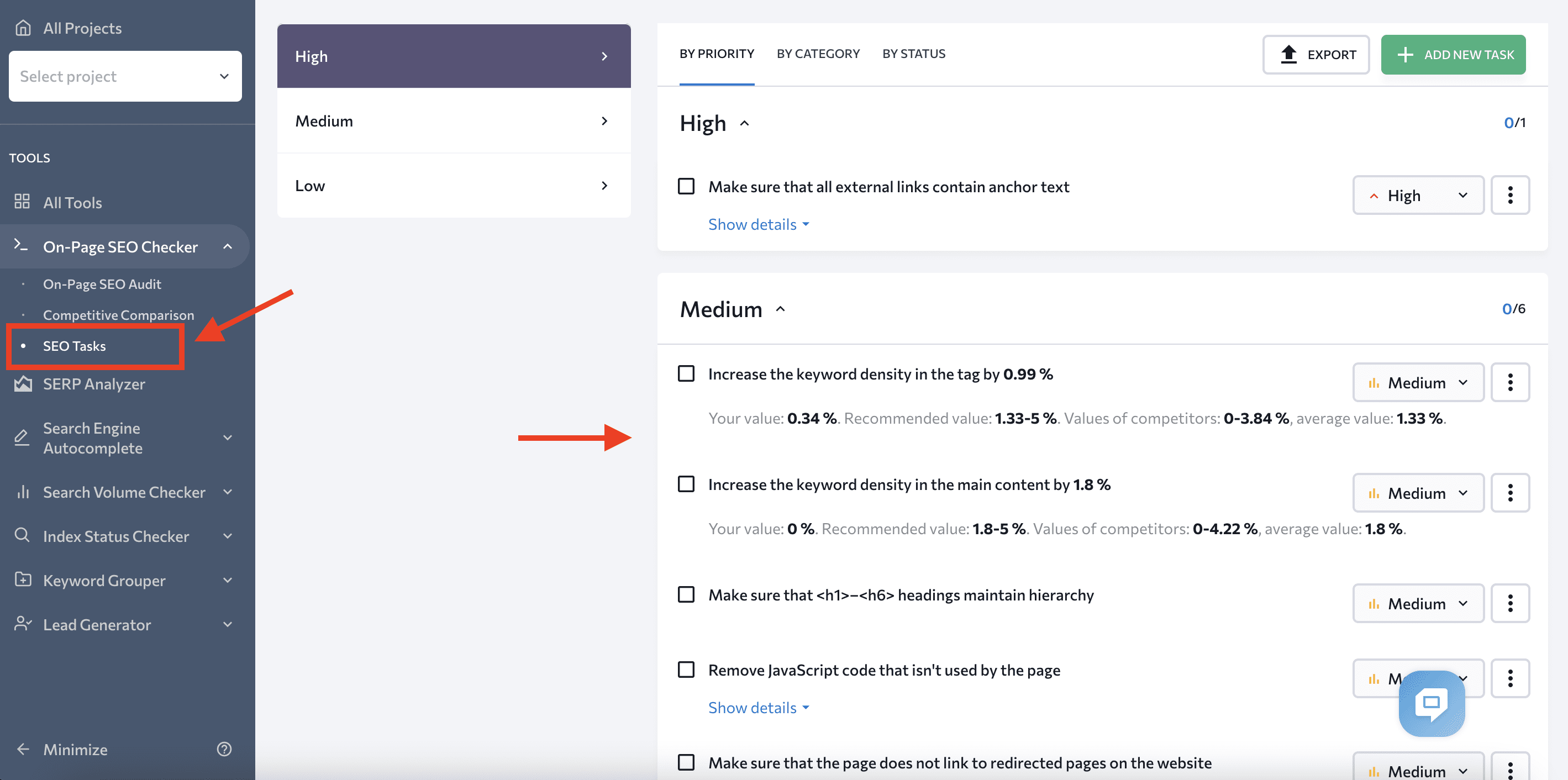
Based on the on-page audit, you’ll get an action plan for improving your pages so they rank higher. These pages can be sorted by priority, category, or status. You can also edit tasks or add new ones.
Now, let’s move on to backlinks, the last essential component of any SEO strategy.
Creating a backlink profile
Sometimes, having a smoothly running website and content that brings unique value to users is enough for Google to start ranking your website. In most cases, though, you’ll need links from other older and more authoritative resources to convince Google that your website is worthwhile.
You may have a slight advantage here as a startup. If you came up with a groundbreaking product idea, the media would be eager to write about you and link to your website. This means that you should start looking for PR opportunities as soon as you’re ready to spread the word about your product’s first achievements.
Reach out to authoritative websites in your niche and ask for mentions. Do influencer marketing. For example, if some known experts try out your product and spread the word about it in their blog or through their social media communities, you’ll not only get backlinks, but also potential customers coming your way. Participate in conferences relevant to your business’s niche to build partnerships with important industry players. Then, you’ll be able to publish blog posts on their websites and promote your marketing campaigns.
PR should be your priority when you’re just starting out because it allows you to accomplish several things at once:
- Your brand awareness and credibility grow.
- You can get backlinks and leads coming through those links.
Also, do not ignore other link-building methods, including:
- Do guest blogging.
- Join relevant forums and answer business-related questions with links in them.
- Submit your website to various business directories.
- Discover creative and new ways to get backlinks.
Ideally, you want to keep an eye on the backlinks you’ve built as you may lose some over time. Doing this will help you in better understanding the kind of backlink profile you currently have. Monitoring every link manually would be too time-consuming, but with SE Ranking’s Backlink Monitoring tool, you’ll only need a few minutes to skim through the report.
It will reveal the following to you:
- If the link is not found or dead
- The indexing status
- Other key SEO metrics (i.e, referring domain authoritativeness and anchor text used)
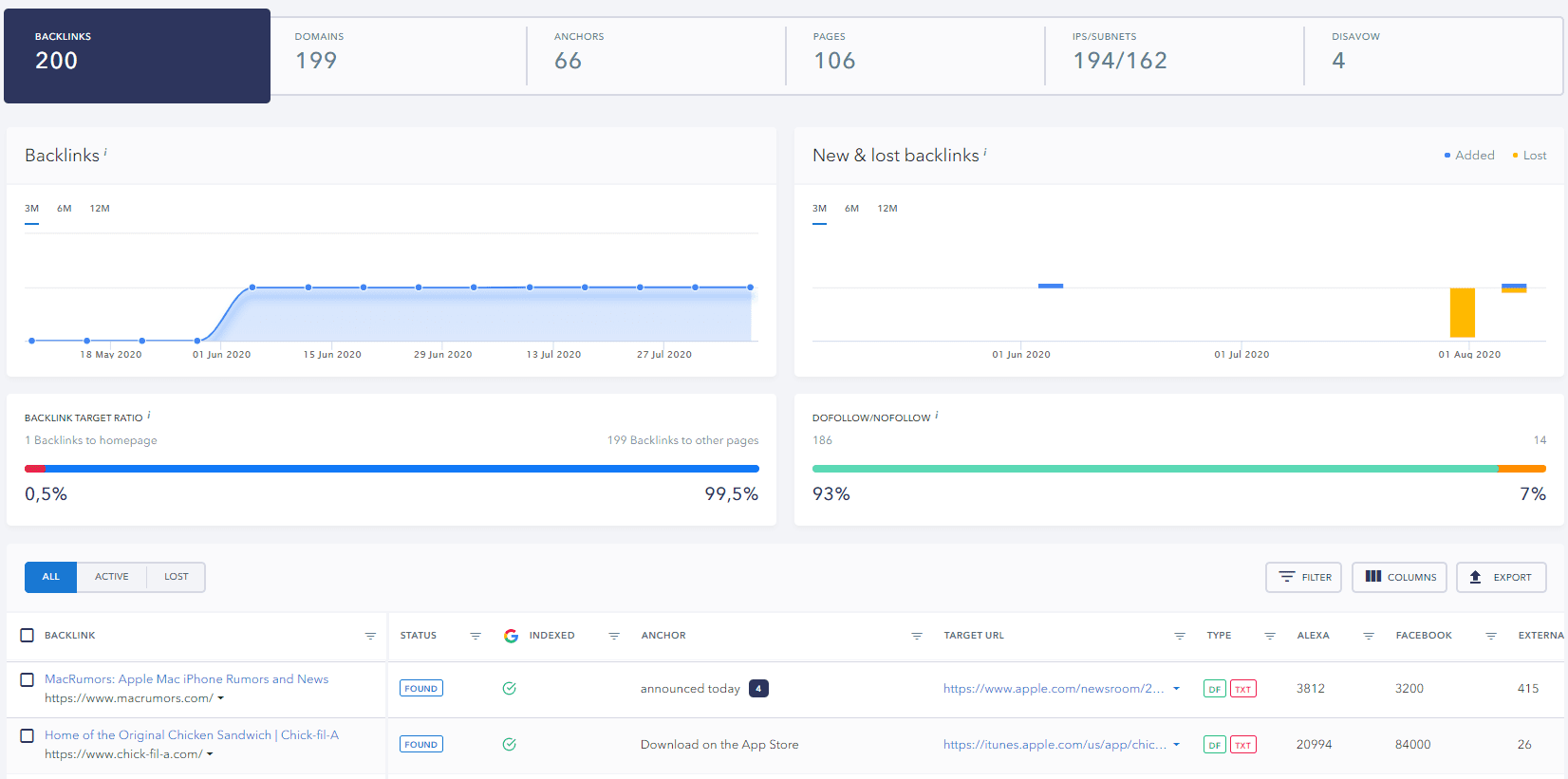
You can add the backlinks you want to monitor manually, import them, or check the backlinks that you’ve lost track of by using the Backlink Checker tool. You can further add the lost backlinks you found for monitoring by pressing a single button.
To find all of your backlinks, enter your website’s URL into Backlink Checker and start the search.
Once the analysis is over, you’ll see all the referring domains; all the links that point to your site, and the anchors they use; and all the fundamental SEO metrics (domain and page trust, link type, first and last seen dates, etc.).
With this tool, you can collect any site’s backlink information, including that of your competitors. Spying on their strategy will give you valuable insights to use for your own backlink profile.
We also suggest using Backlink Gap Analyzer to compare several sites. This means you can compare your website with one or more of your competitors’ sites, or just pit several competitor websites up against one another. This helps you find domains and pages that link out to your competitors but not to your site. You’ll also discover the backlinks that you have in common.
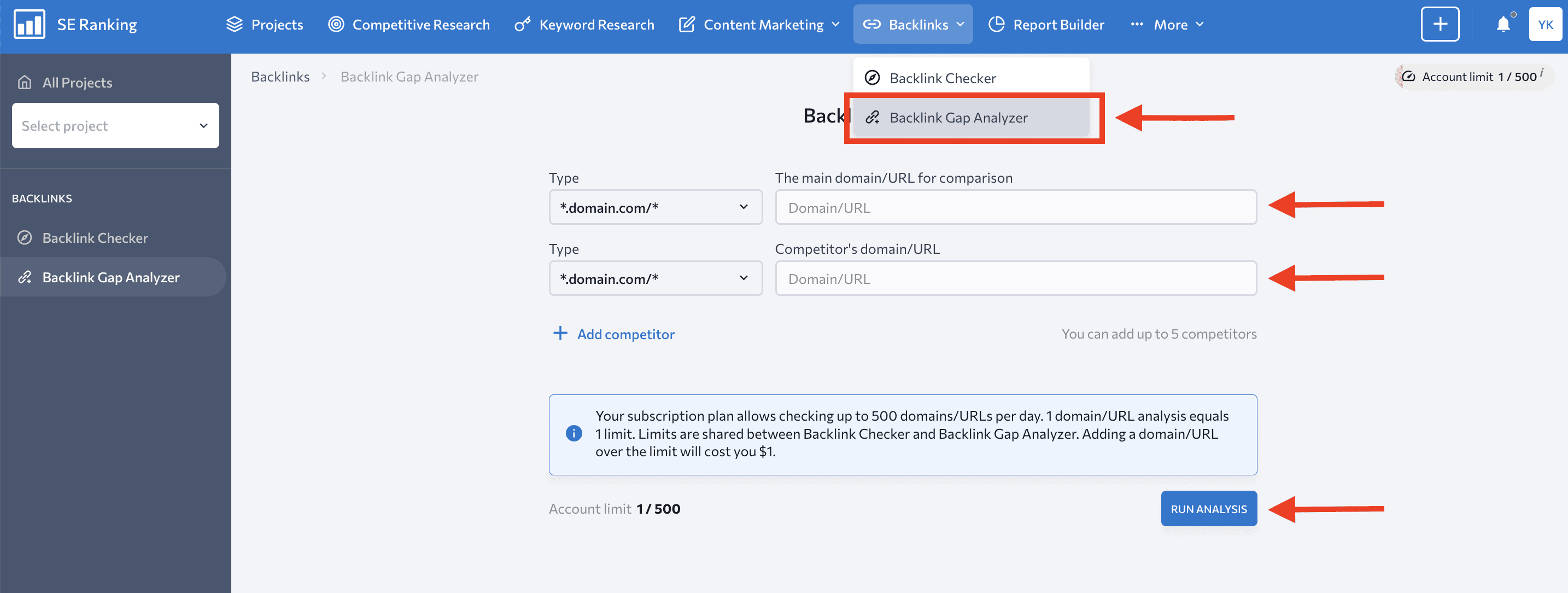
Keep in mind that quality (not quantity) should be your top priority when building links. Spammy backlinks from irrelevant sources will not do your website any good. If Google decides that you are using or are involved in manipulative link-building techniques, it will penalize you. You may feel tempted as a startup to find some shortcuts and quickly get tangible results, but it’s better to resist the temptation. The price of losing favor with Google is too high, and the majority of link-building schemes that worked in the past are now outdated.
Making your website user-friendly
A website with good UX has the following:
- Easy navigation. Users can easily travel from page to page and find the information they’re looking for. It follows the unspoken rule of four clicks. Under this rule, users should have to click no more than four times to get to any page from the website’s homepage. You also shouldn’t confuse visitors with strange menu or button texts. Consider applying UX writing techniques to accomplish this.
- Visual attractiveness. Your site’s design and layout should be clear and logical while also being aesthetically pleasing. You can use visuals but optimize them properly by using alt tags, following size recommendations, and more.
- Core Web Vitals. Recently, Google announced that it uses CWV to determine a website’s loading speed, so track your site’s first screen-loading time, its ease of interaction, and its visual stability because low values can send bad signals to Google.
- Mobile-friendliness. Almost 59% of searches are made via mobile devices. Chances are you’re reading this article with your smartphone. You wouldn’t like it if the page took forever to load, the images weren’t displayed, or if they overlapped. The design must be adaptive and responsive to different devices, and all elements must be displayed correctly.
SE Ranking’s Website Audit tool (we mentioned it earlier) can help you catch many different errors, including some that are UX related. Just run a check to analyze the Website Speed, Images, Mobile Optimization, and Performance tabs in the Issue report.
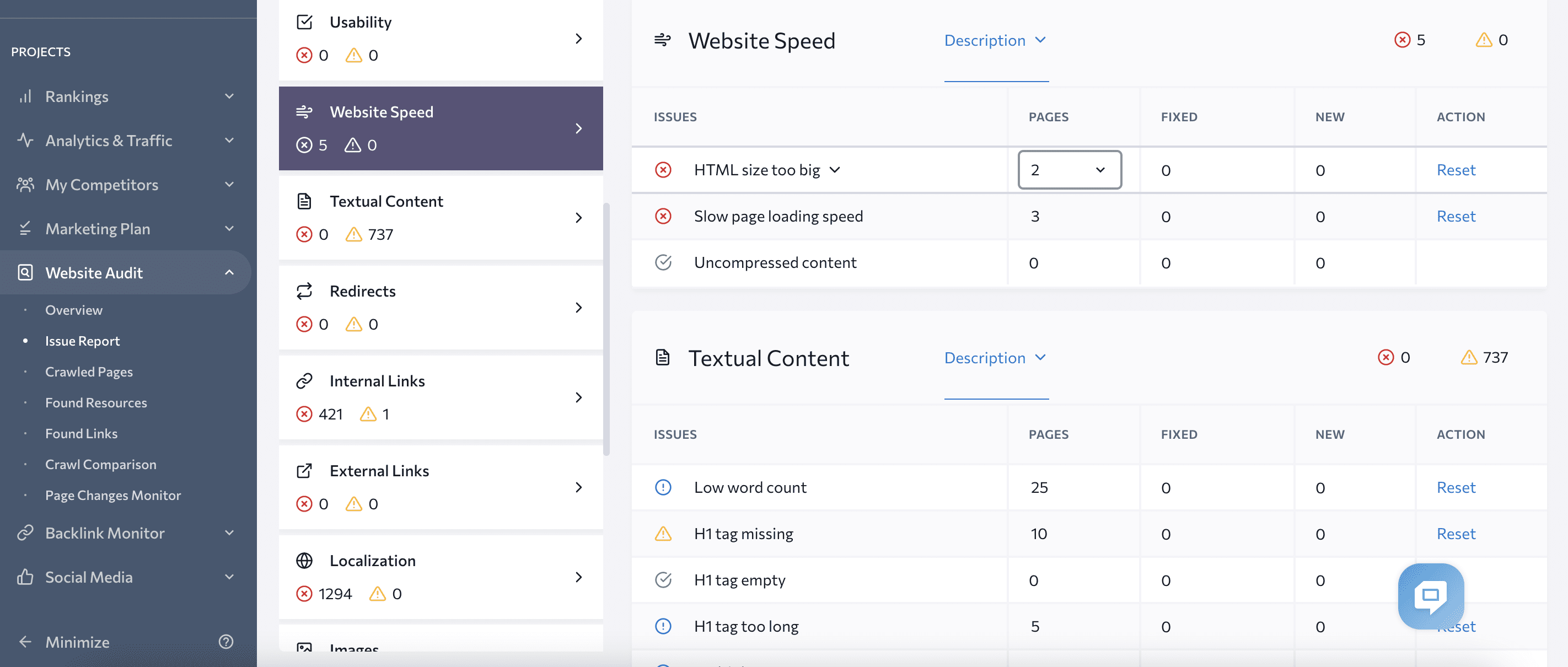
Tracking SEO results
No matter what changes and improvements you make, you won’t know if you’re moving in the right direction unless you analyze their performance and results.
Depending on your goals as a startup, you can focus on different metrics, but we recommend that you always keep an eye on the primary ones listed below:
- Keyword Rankings. Monitor these to see how your site’s positions change in search results for search queries relevant to your business.
- Organic traffic dynamics. See how many users come to your website from organic search. If your organic traffic is rising, your SEO strategy and efforts are working. You should also monitor the country from which your primary source of traffic originates. For example, if your business targets users in the UK, traffic from India isn’t relevant.
- Website quality metrics. Track any improvements or deterioration in your site’s Website Health Score values to determine if its quality and technical condition correspond to the ideal level.
- Backlink profile health. The quality of your site’s backlink profile directly affects its ranking. The more high-quality backlinks you have, the more likely it is that your rankings will improve. Keep track of your Domain Trust score, monitor new and lost backlinks, and analyze referring domains and anchors used.
- The number of indexed pages. Unless they are indexed, your pages won’t rank or drive organic traffic. Check how many pages are indexed, how many are not, and why, and how quickly new pages are indexed.
- Core Web Vitals. Since CWV are considered a ranking factor, monitoring and improving them is a must.
These are some of the most important metrics to focus on. You can find most of them in SE Ranking’s toolset and various Google Search Console reports.
Examples of how startups use SEO
Now, let’s look at how some recent startups approached (and benefited from) their SEO strategy.
Keep in mind that all three of the websites that we’re going to analyze perform quite well in terms of SEO. One interesting detail that they have in common is that they all have old domains. Some are over 20 years old.
While this wasn’t one of our criterion for selecting startup websites, it is possible that using old domains is one of the reasons they have a lot of organic traffic. Their domains already have a long history (and probably an existing list of strong backlinks), which could be quite a strong signal for Google.
This is more of an exception than the rule, as newly created startup domains are often much weaker and don’t perform that well in organic search.
Pacaso

Pacaso is a property broker founded in 2020. It buys single-family homes and sells them to consortiums of buyers. Pacaso is basically a marketplace for buying and selling second homes. It also simplifies scheduling dates and owning homes.
Pacaso’s domain age is 21 years. Its monthly organic traffic is 87.3K as of January 2024.
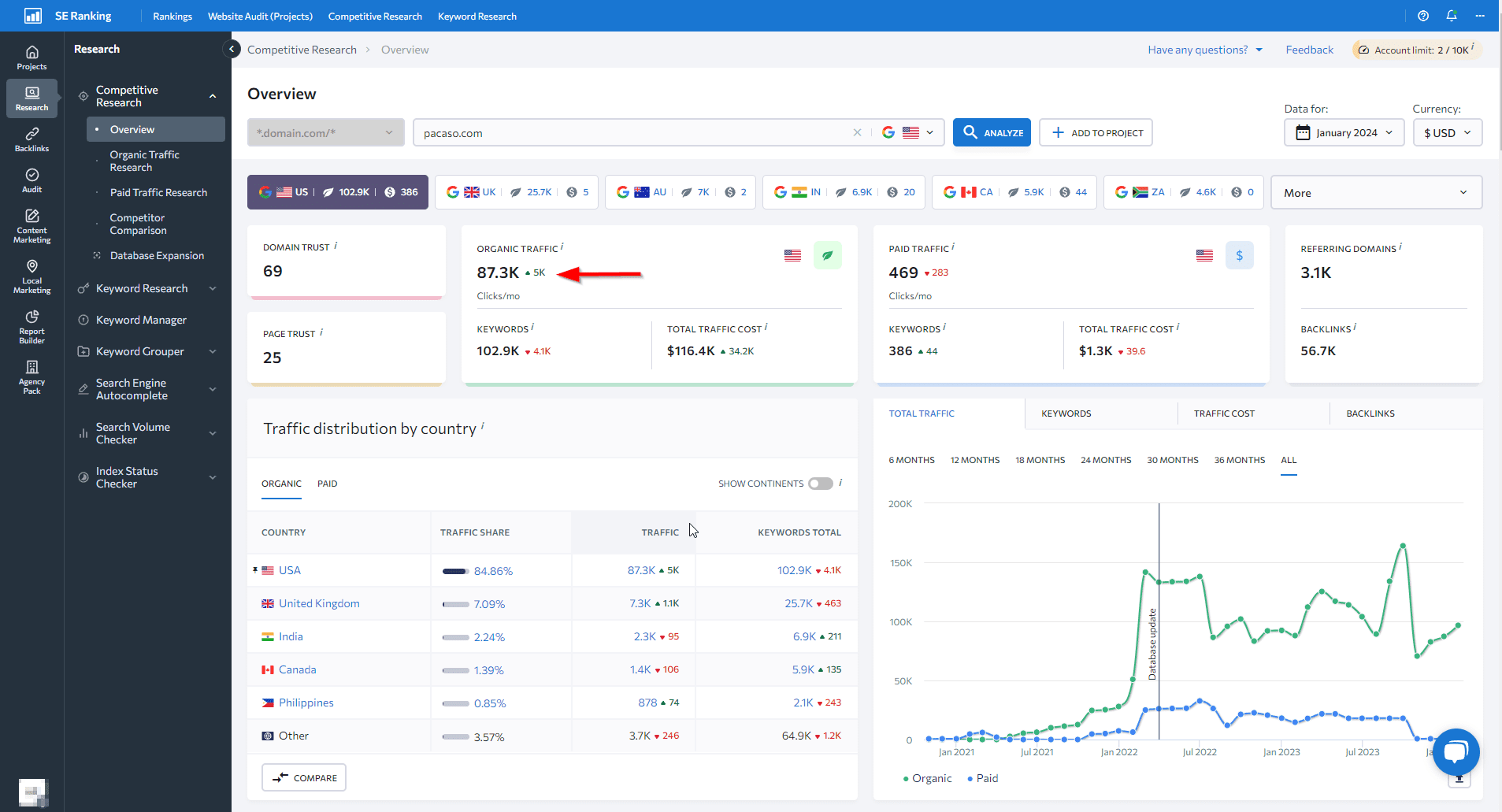
Pacaso’s organic traffic increased from 2,465 visits per month in May 2021 to 87,335 visits in January 2024.
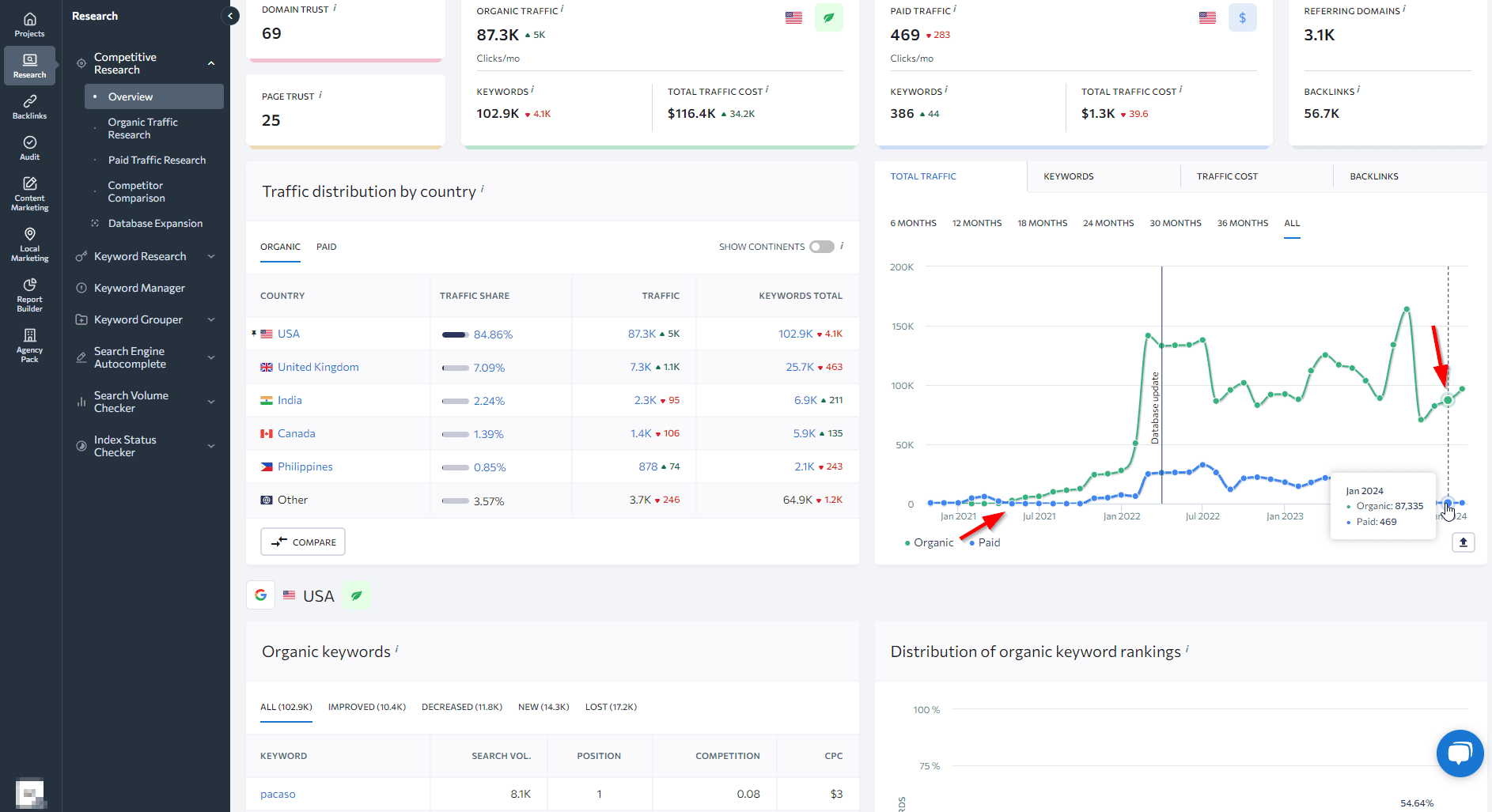
The top five pages of Pacaso’s website include its:
- Homepage: https://www.pacaso.com/ with 100.54K clicks (63.76%)
- Blog post: https://www.pacaso.com/blog/what-does-property-manager-do with 9.08K clicks (5.76%)
- Blog post: https://www.pacaso.com/blog/what-is-co-ownership-property with 5.87K clicks (3.72%)
- Blog post: https://www.pacaso.com/blog/airbnb-alternatives with 4.05K clicks (2.57%)
- Blog post: https://www.pacaso.com/blog/zen-room-ideas with 3.68K clicks (2.33%)
Pacaso has 56.7K backlinks from 3.1K referring domains. Its domain trust score is pretty decent: 69 out of 100.
Its website also has a sound hierarchical structure, easy navigation, and decent UX. It also follows the rule of four clicks. Pacaso’s pages and the various elements within them are optimized, load quickly, and are stable on different screens. Its website security is also decent.
However, performing an audit of Pacaso’s website reveals that its health score could be better. Its health sits at a low 55. This is likely because some of the issues detected during the check are considered critical and warrant proper fixes.
Some of these issues include:
- 4XX images (Not Found)
- URLs with duplicate page titles
- Duplicate descriptions
- No inbound links
- Hreflang to non-canonical
- Multiple language codes for one page
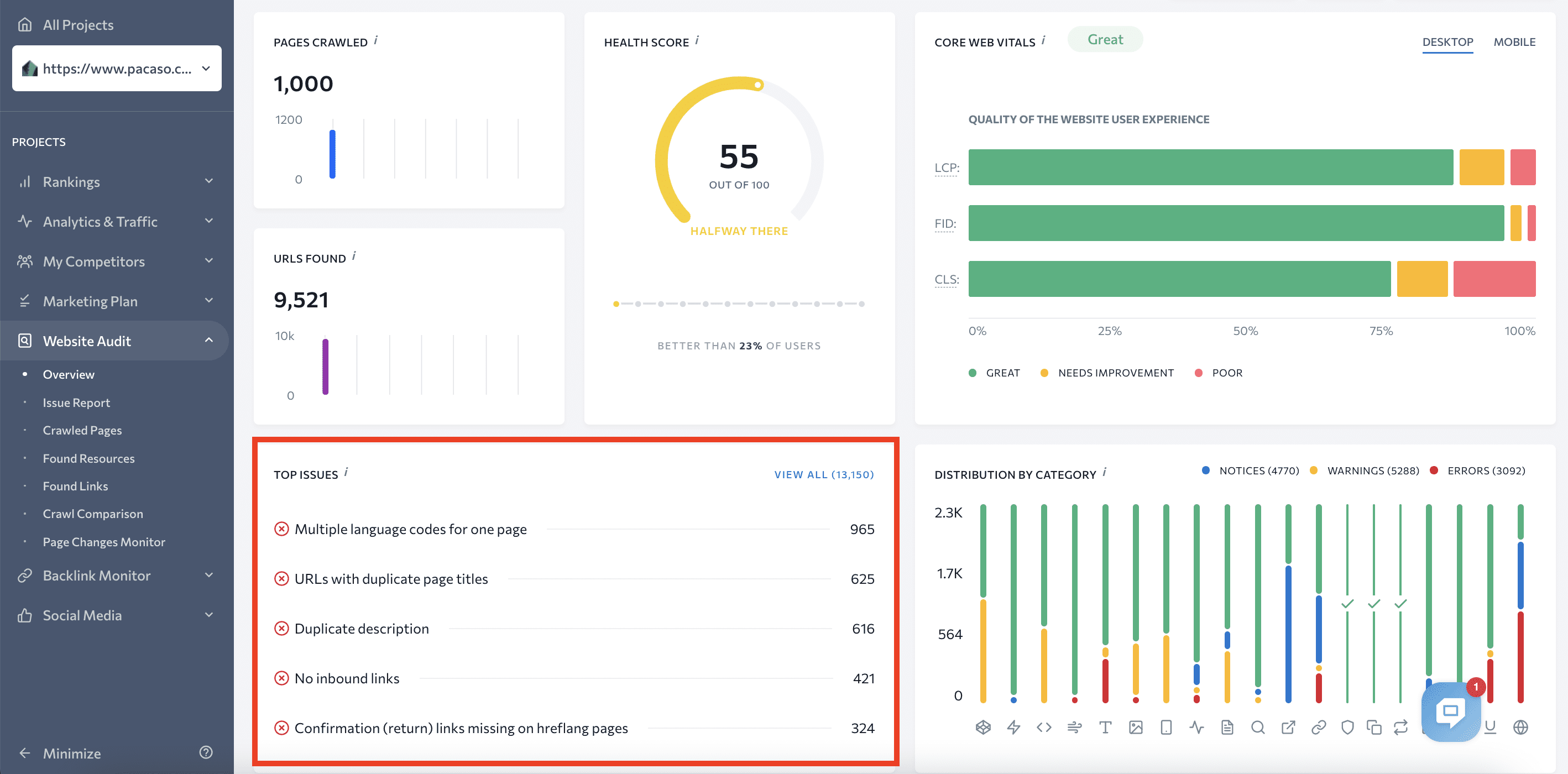
Pacaso’s website already performs well in organic search, but it could use some improvement when it comes to technical SEO.
Ramp
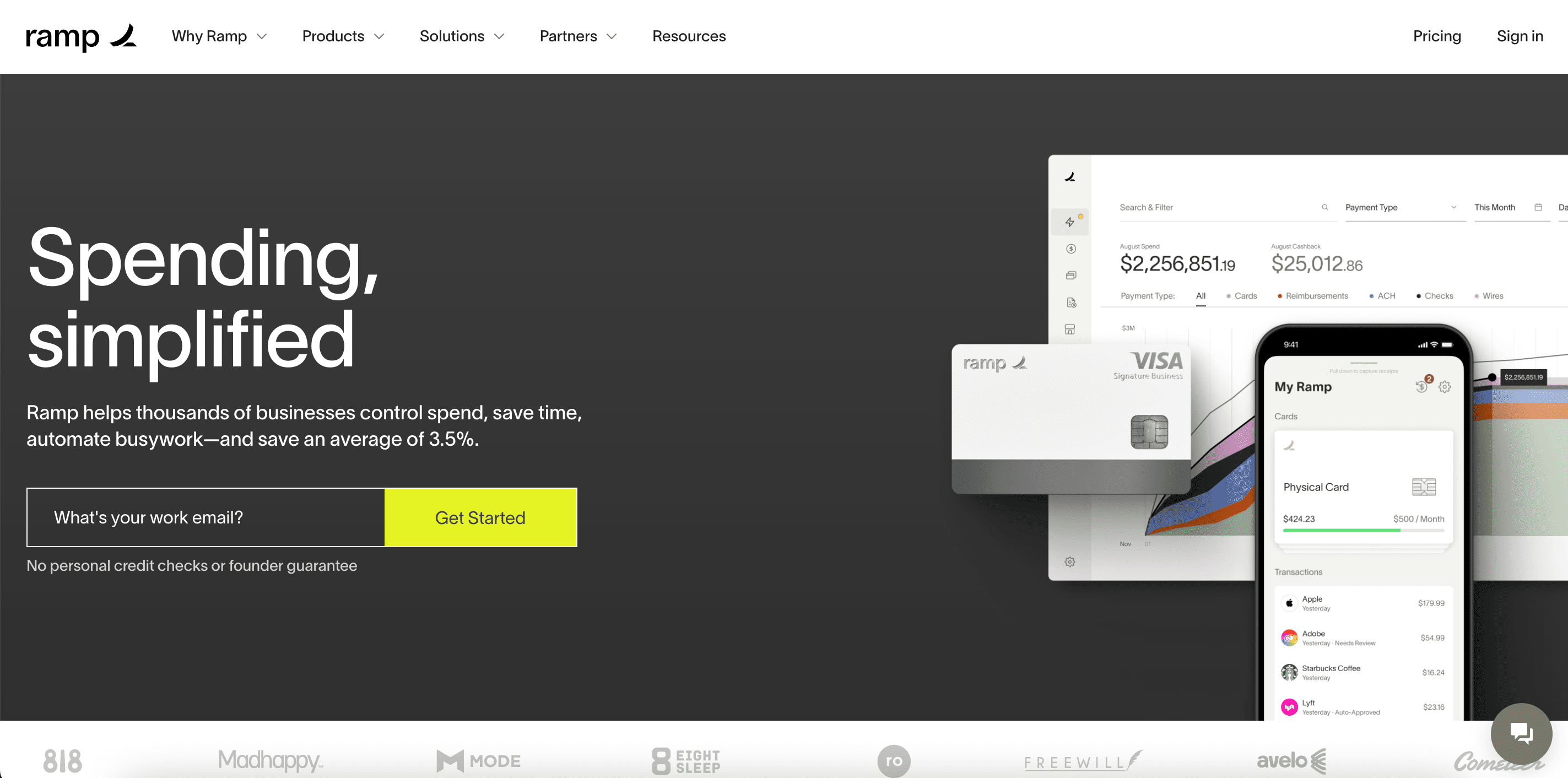
Ramp is a corporate credit card and expense platform established in 2019. It provides financial services and tools for over 10,000 businesses, including physical and virtual cards, expense and reimbursement management, accounting automation, etc.
Ramp’s website domain age is 29 years old, and its monthly organic traffic is 97.2K as of January 2024.
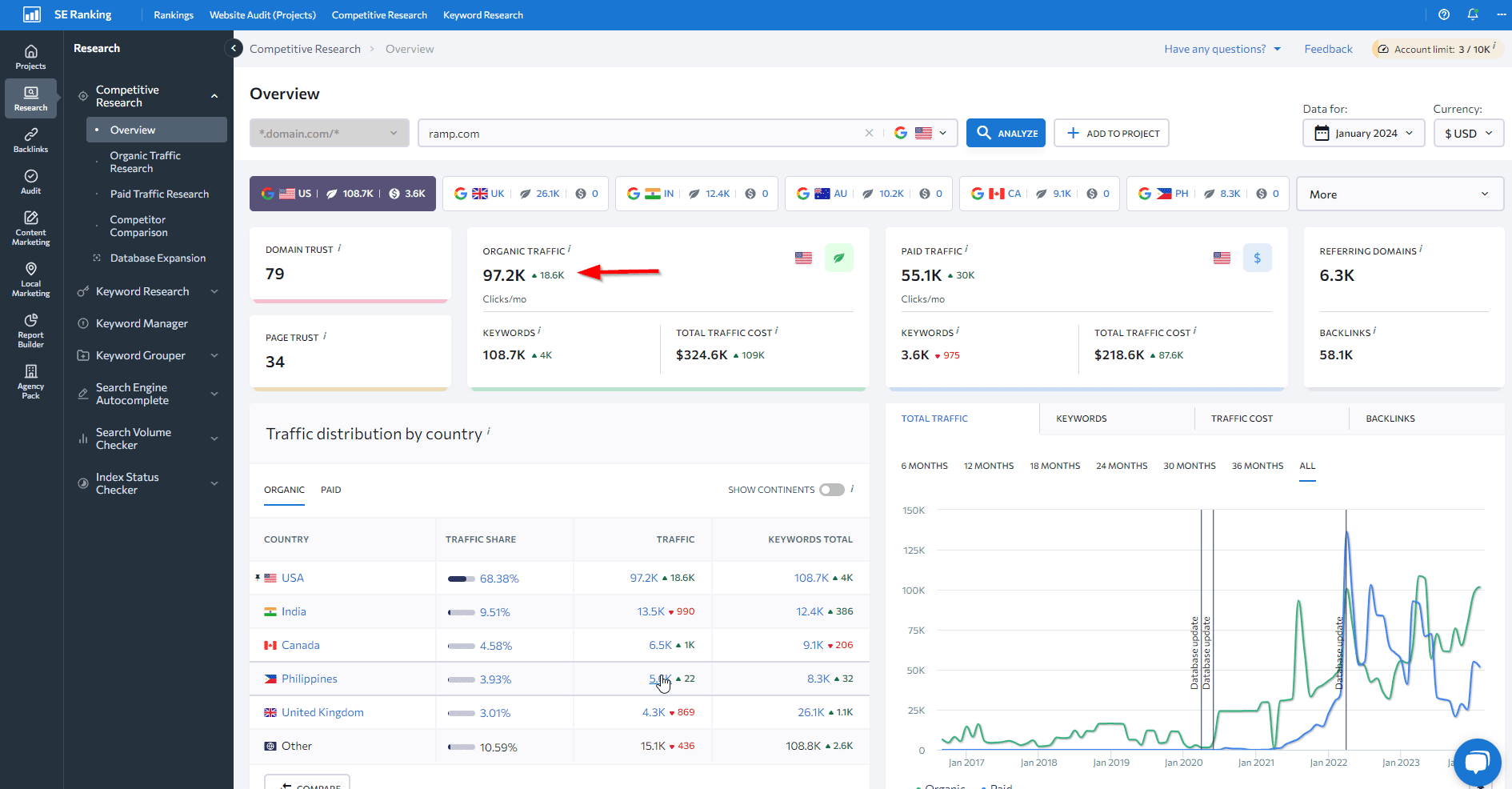
We noticed some organic traffic ups and downs throughout the company’s existence. Its lowest point was in April 2021, when it had 886 visits per month. Since then traffic has gradually increased to 97,161 in January 2024.
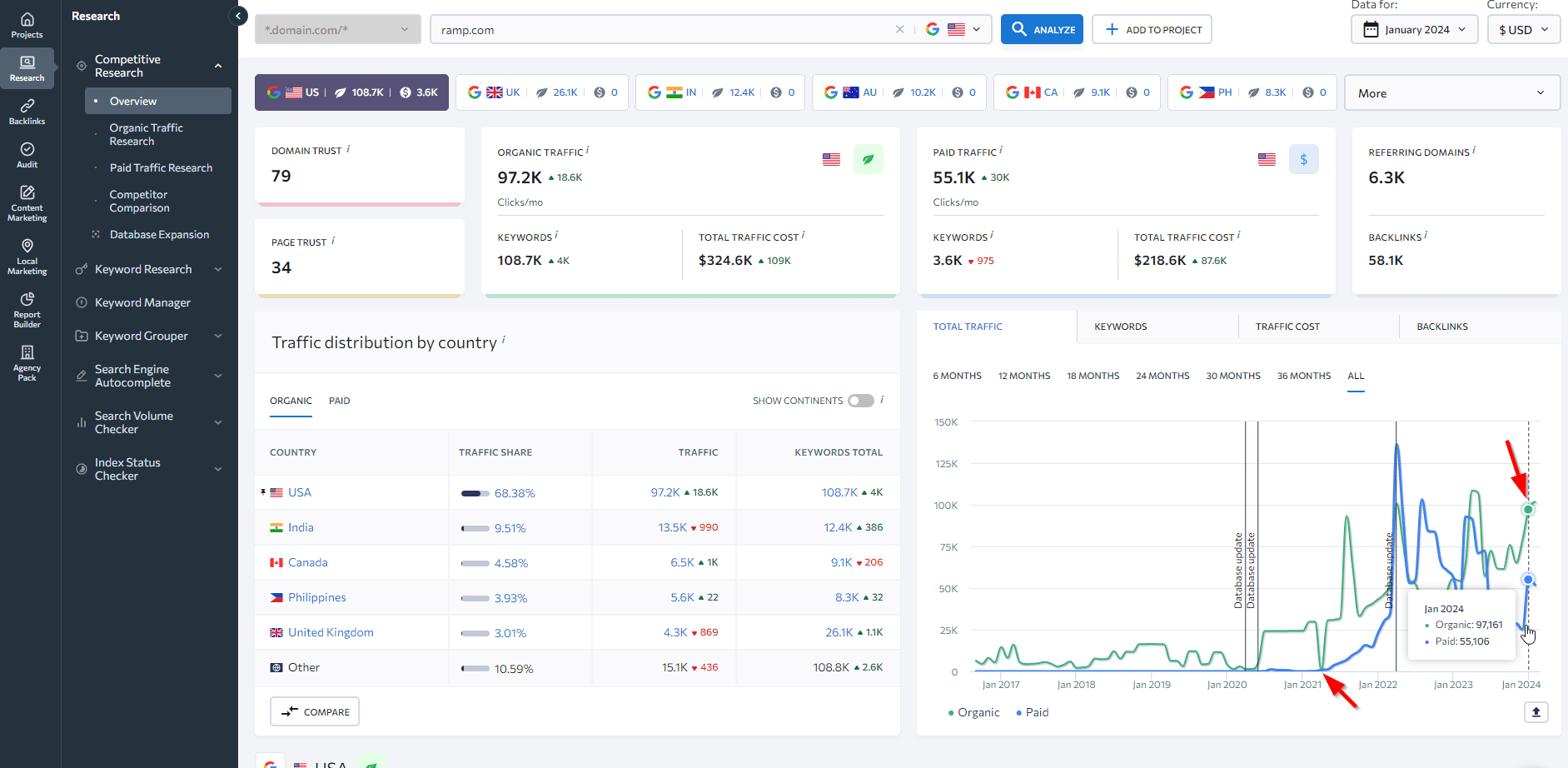
Ramp’s top five pages include its:
- Home page: https://ramp.com/ with 49.03K visits (39.98%)
- Paylocity integration page: https://ramp.com/integrations/paylocity with 12.22K visits (9.97%)
- Free business name generator page: https://ramp.com/company-name-generator with 6.8K visits (5.55%)
- Protonmail landing page: https://ramp.com/pricing-intelligence/protonmail with 4.51K visits (3.67%)
- Sign-in page: https://ramp.com/sign-in with 3.57K visits (2.91%)
Ramp’s website has 58.1K backlinks from 6.3K referring domains. Its domain trust score is the highest among the analyzed sites, 79 out of 100.
It also has a clear site structure. Ramp’s pages are categorized to make navigation easier for users and bots. It has a responsive design that allows the website to adapt to different screen sizes. Its visual elements are also stable and load quickly.
Ramp’s website, unfortunately, has almost no critical security, crawling, usability, or redirect errors, and its health score is the lowest among the websites we analyzed; 40 out of 100. The primary reason for this is that it has way too many 4XX images (Not Found).
Some other major issues we found are:
- Duplicate content
- Duplicate description
- Identical Title and H1 tags
- URLs with duplicate page titles
- Image file sizes are too large
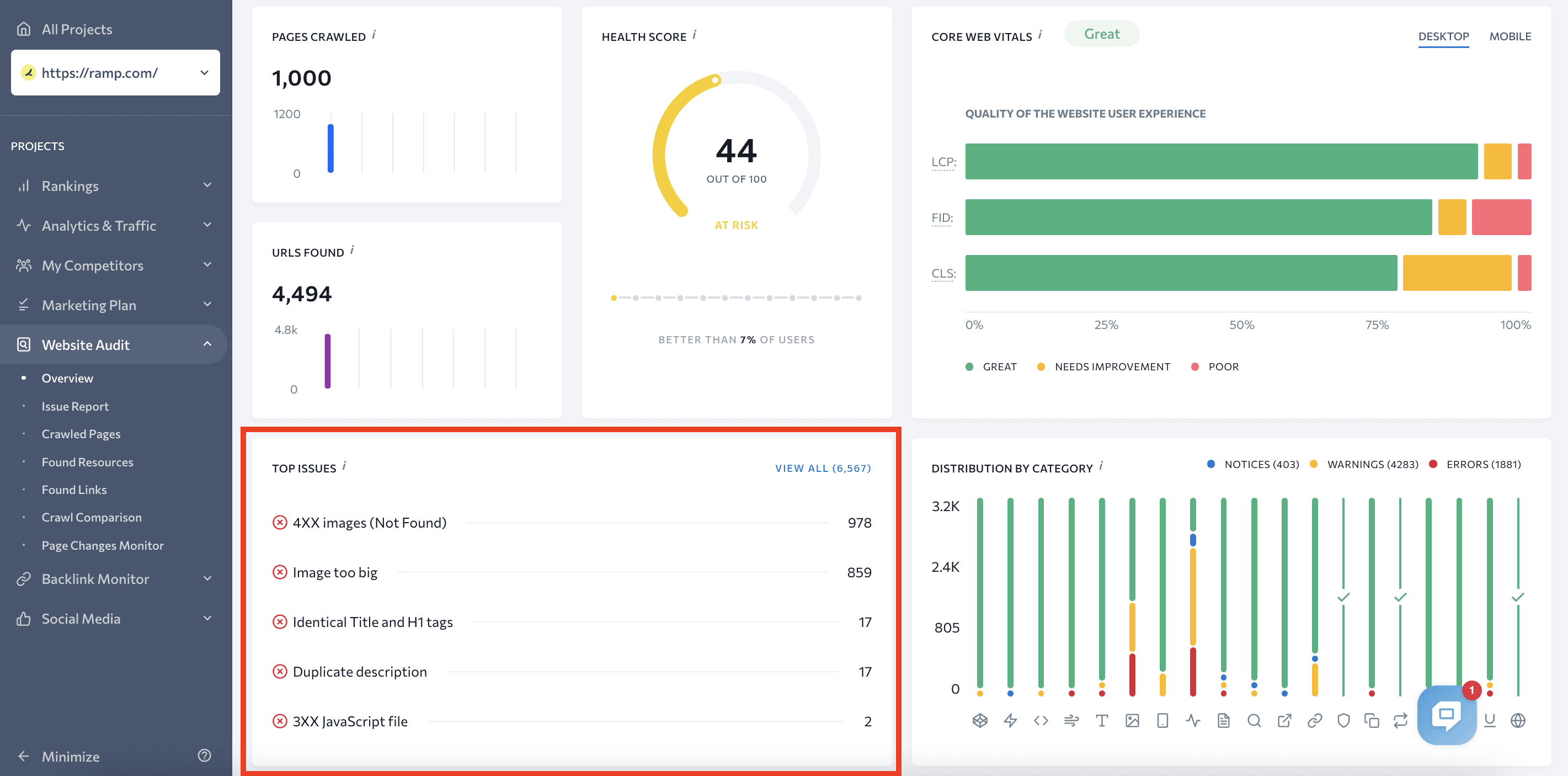
Cerebral
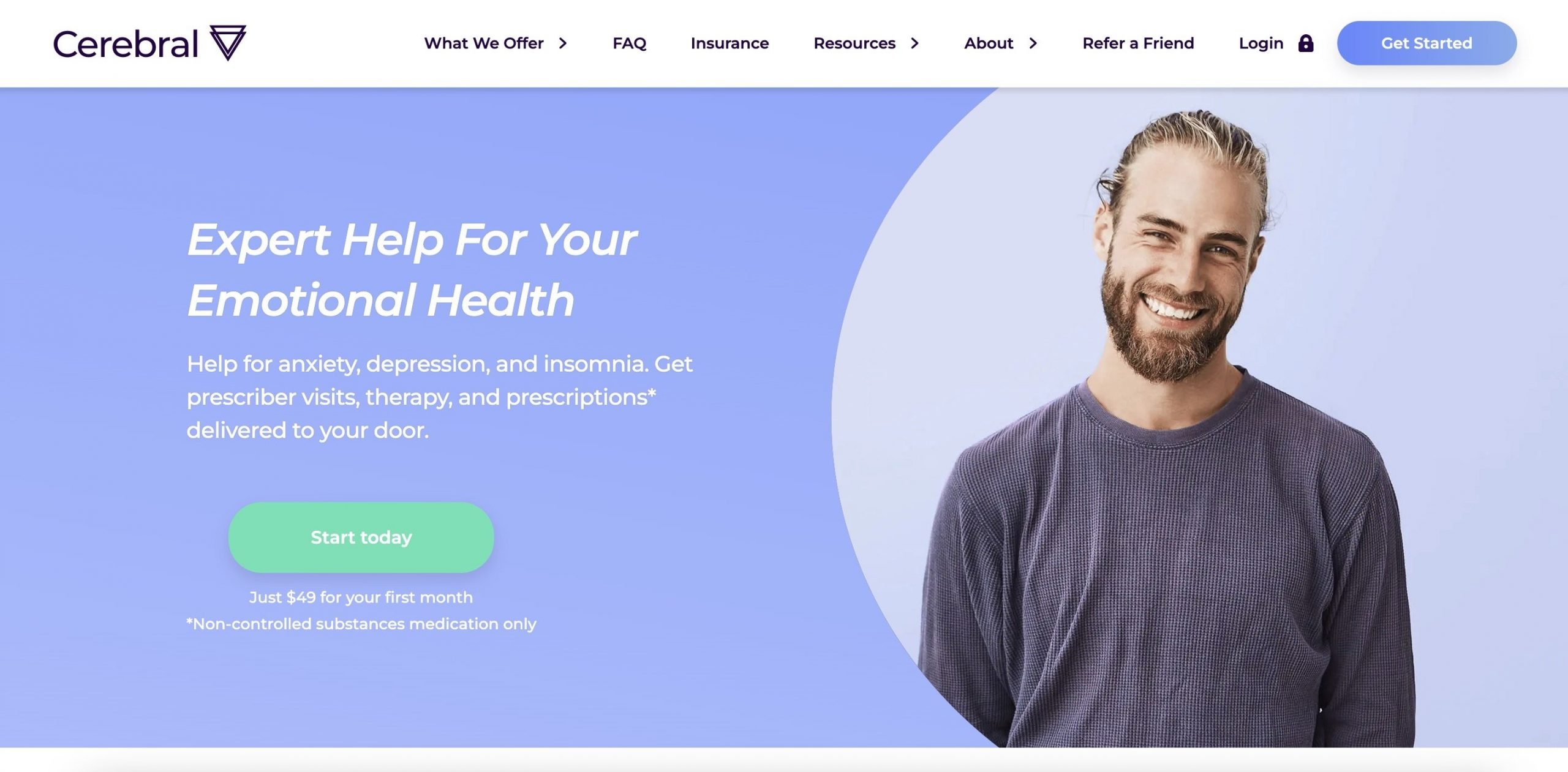
Cerebral is a telemedicine company founded in 2020. It provides patients with psychological counseling and treatment. In the beginning of the COVID-19 pandemic, Cerebral experienced significant growth because the demand for virtual services skyrocketed. This helped it become one of the world’s largest online mental health providers.
Cerebral’s website domain age is 28 years old, and drives 15.3K organic visitors per month as of January 2024.
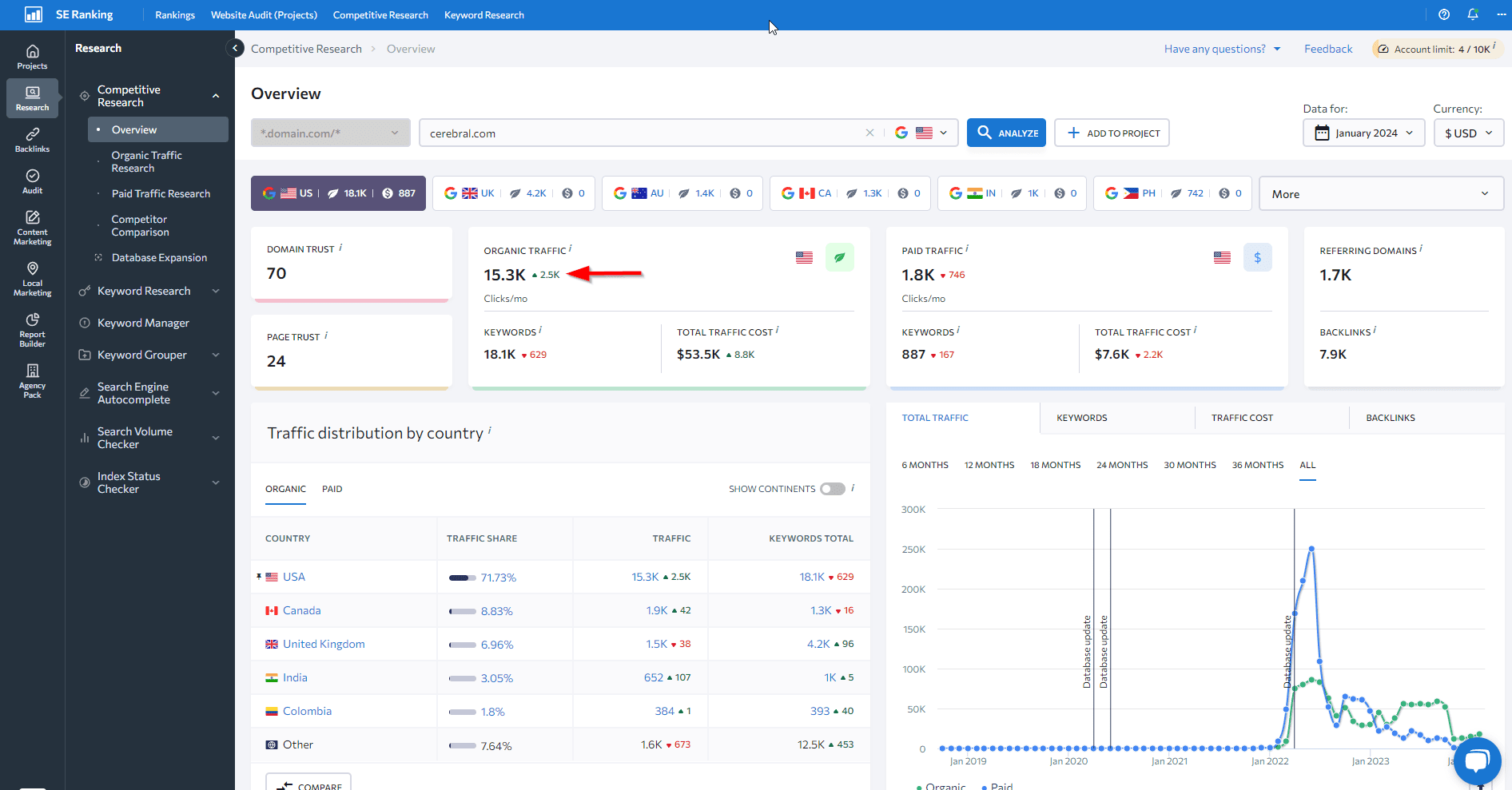
Its organic traffic started to grow significantly in November 2021, from 0 visits per month to 15,313 visits per month as of January 2024.
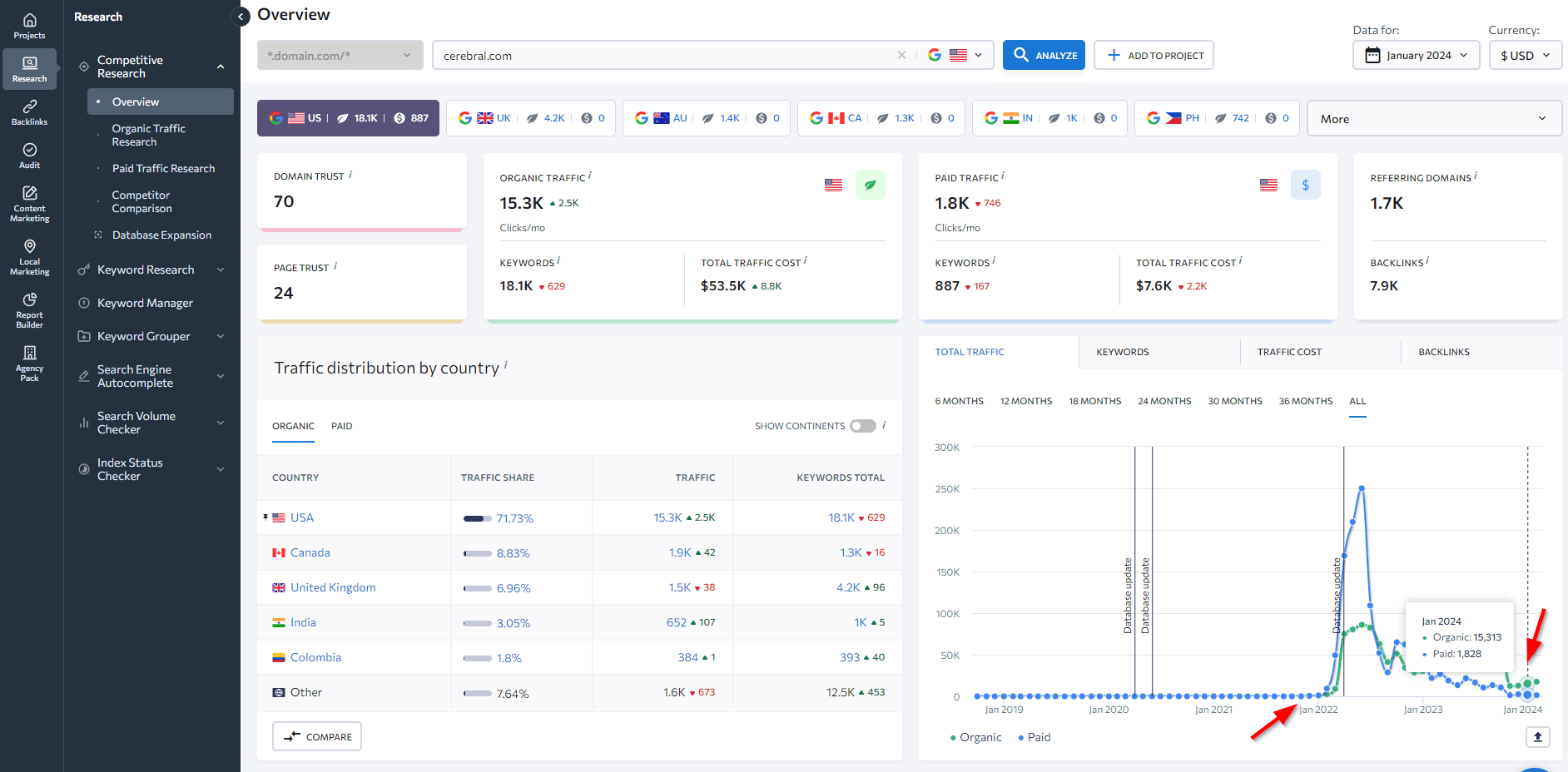
Cerebral’s top five pages include its:
- Home page: https://cerebral.com/ with 65.56K visits (79.82%)
- ADHD landing page: https://cerebral.com/online/online-adhd-test-diagnosis/ with 3.6K visits (3.38%)
- FAQ page: https://cerebral.com/faqs with 1.86K visits (2.26%)
- Depression and Anxiety landing page: https://cerebral.com/prescription-medication with 1.37K visits (1.67%)
- Contact us page: https://cerebral.com/about-cerebral/contact/ with 672 visits (0.82%)
Cerebral’s website has 7.9K backlinks from 1.7K referring domains. Its domain trust score is much higher than the previous sites we analyzed (70 out of 100), but there’s still room for improvement. It could use a stronger backlink profile to land an ever better position in the SERPs.
Its website is easy to navigate due to the silo-like structure. All of its pages are united into categories and connected via internal links. It doesn’t have crawling, security, localization, or speed issues, but its general health score is medium: 53 out of 100.
Cerebral’s top, most pressing errors are:
- Duplicate content on some pages
- URLs with duplicate page titles
- Duplicate descriptions
- Redirect chains
- Image optimization issues
- 4XX HTTP Status Codes
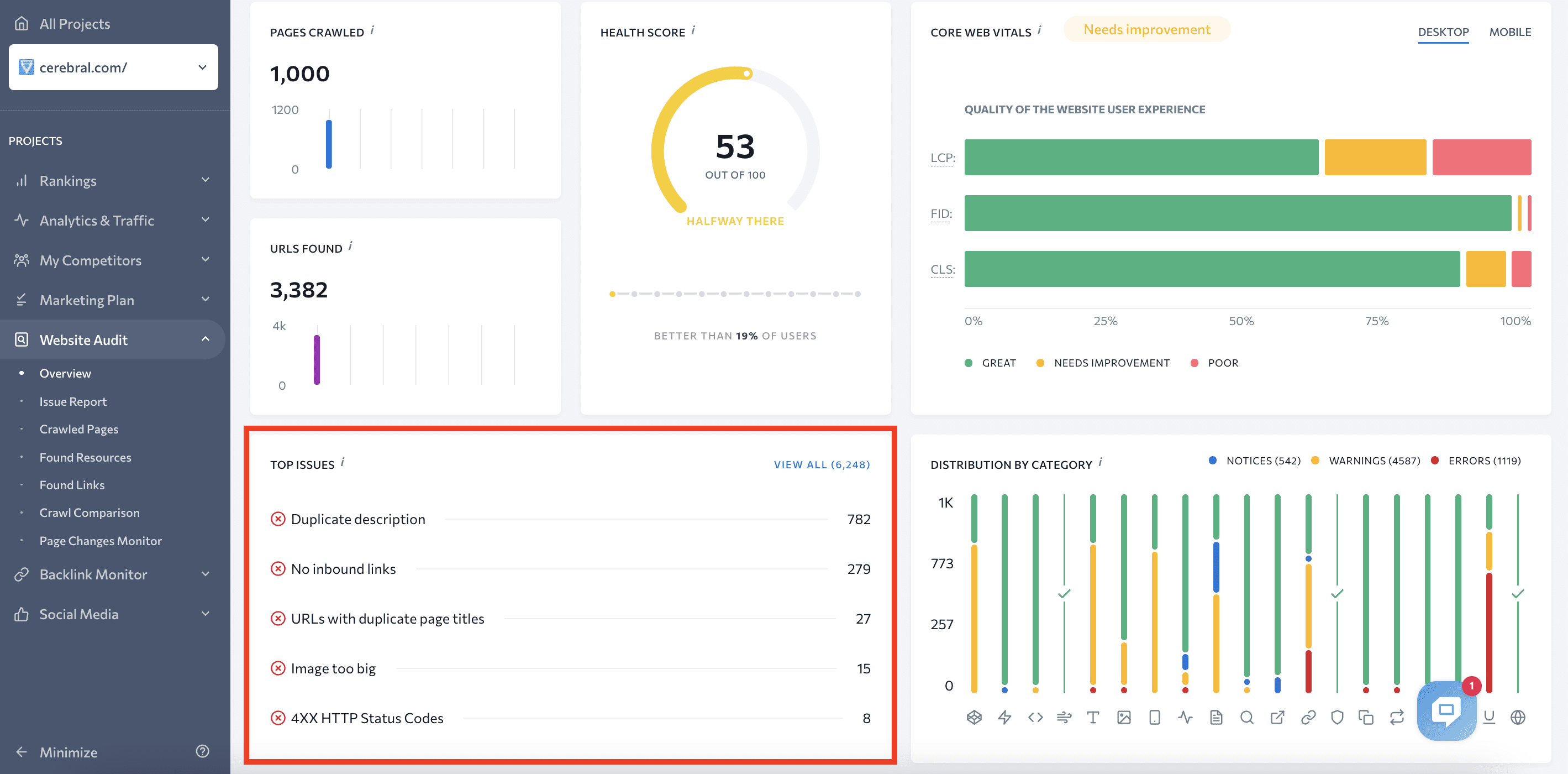
Closing thoughts
SEO is a resource-intensive and time-consuming game that not all startups will be eager to play. Still, it’s an essential part of any sustainable business development strategy. The time and effort you invest in making your website SEO-friendly will pay off when you start getting free organic traffic. Search engines can be an inexhaustible source of targeted leads once you develop an effective SEO strategy.
After all, doing SEO isn’t as simple as having lots of extra, tedious tasks to complete. It’s about running a website that brings value to your users, which is something you should be striving for anyway. Getting media coverage should also be on your startup’s top priority list. Following SEO best practices will propel you in the right direction while reaping all sorts of benefits. SE Ranking’s tools, of course, can help you stay on top of today’s and tomorrow’s ever-evolving SEO best practices.

